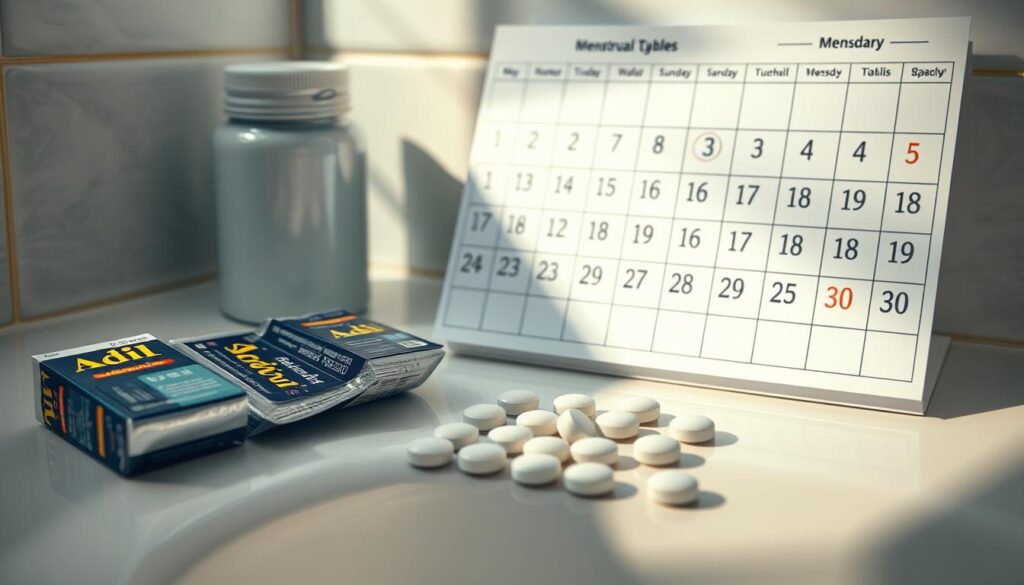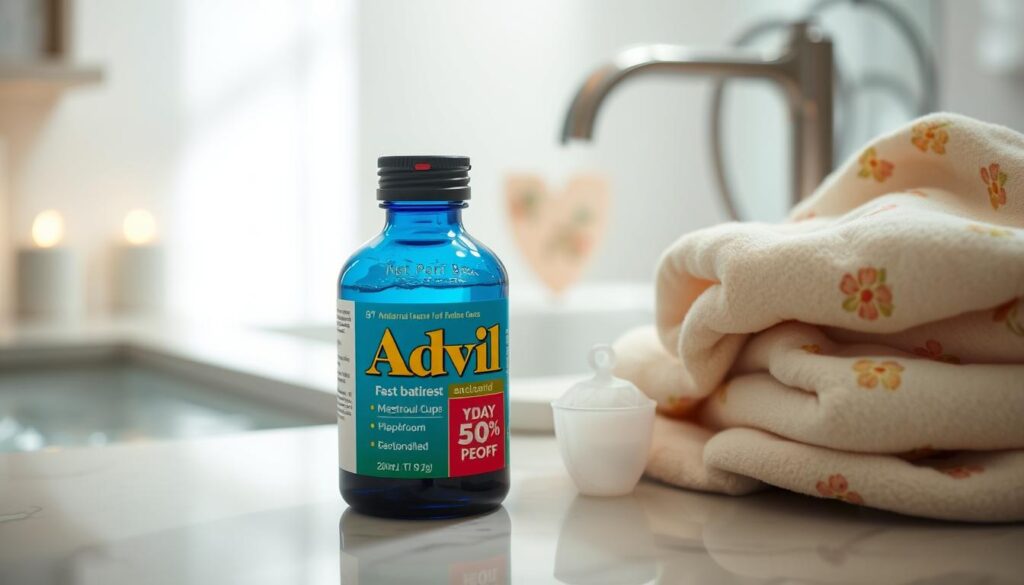Have you ever found your menstrual cycle acting on its own? When there’s a big event ahead, and you worry about a late period. Many people face this issue, looking for ways to kick-start their period. Advil, found over-the-counter, might be the answer. Its active ingredient, ibuprofen, eases menstrual pain. But does it affect when your period starts? This question goes beyond curiosity—it’s about managing your body’s natural rhythms. Let’s delve into how this popular drug could impact your menstrual cycle.
Key Takeaways
- Advil is an anti-inflammatory drug that may influence menstrual relief.
- The average menstrual cycle occurs every 21 to 35 days.
- Stress and hormonal factors can affect menstrual timing and flow.
- Prostaglandins play a crucial role in the menstrual cycle and pain relief.
- Consulting a healthcare provider is essential before trying to induce your period.
- Other methods of managing period timing include hormonal birth control options.
- Understanding your body’s signals is key to effective menstrual management.
Understanding Your Menstrual Cycle
The menstrual cycle is all about preparing your body for a possible pregnancy. It usually lasts about 28 days but can range from 21 to 35 days. It has four main parts: menstrual, follicular, ovulation, and luteal phases.
During the menstrual phase, your period happens, shedding the uterine lining because no baby was formed. Next comes the follicular phase. This is when the ovaries’ follicles get ready, leading up to ovulation.
When ovulation happens, an egg is sent out from the ovary, usually on day 14 of a normal 28-day cycle. After this, the luteal phase starts. Your body gets ready just in case of pregnancy by making more progesterone. If there’s no baby, hormone levels fall, and a new period begins.
Knowing your cycle phases helps you spot what your body is doing. Hormones like estrogen and progesterone guide these stages. They affect your mood and health. So, understanding these changes is key to managing your menstrual cycle well.
| Phase of the Cycle | Day(s) | Key Events |
|---|---|---|
| Menstrual Phase | 1-5 | Shedding of the uterine lining occurs, marking the start of the period. |
| Follicular Phase | 6-14 | Follicles develop in the ovaries, preparing for ovulation. |
| Ovulation | 14 | A mature egg is released from the ovary. |
| Luteal Phase | 15-28 | Body prepares for pregnancy; menstruation begins if no fertilization occurs. |
The Role of Prostaglandins in Menstruation
Prostaglandins are key substances made from a fatty acid in cell membranes. They mainly cause uterine contractions to help shed the uterine lining. This leads to menstrual bleeding. When there’s too much prostaglandin, you can get severe menstrual cramps. This pain is known as dysmenorrhea.
It’s important to have the right amount of prostaglandins. They are vital for managing pain and controlling inflammation. But, too much can lead to heavy menstrual bleeding or menorrhagia. It can also cause chronic pain conditions and make you more sensitive to pain.
There are several treatments that use man-made prostaglandins. For example:
- Dinoprostone: It’s often used to open the cervix in people who are pregnant and close to giving birth.
- Alprostadil: This is used to treat erectile dysfunction by boosting blood flow.
- Misoprostol: It’s given to manage bleeding after childbirth and to help with uterine contractions during miscarriages.
Also, drugs like ibuprofen (Advil) and naproxen (Aleve) are often used. They work against prostaglandins to ease menstrual cramps during periods.

Keeping prostaglandin levels balanced is key. Too much can cause pain and issues like dysmenorrhea. But, too little can lead to other health problems. Prostaglandins play a big role not just in menstruation. They are important in many body functions and health conditions.
How Does Advil Affect Prostaglandins?
Advil has ibuprofen as its key component, acting mainly to reduce inflammation. It lowers the production of prostaglandins in our bodies. These chemicals are vital in menstruation, causing uterine contractions and linked to menstrual pain.
Ibuprofen can ease menstrual pain by reducing prostaglandin levels. With lower levels, the intensity of uterine contractions decreases. This leads to less pain. Research shows that high-dose anti-inflammatories like ibuprofen can reduce menstrual flow by 10% to 20%.
To effectively influence menstrual cycles, a specific dose of ibuprofen is needed. This is often 800 milligrams every six hours. Alternatively, naproxen, with a recommended dose of 500 milligrams three times a day, also works similarly. However, ibuprofen can only postpone periods for up to two days at most.

Ibuprofen helps with menstrual pain but doesn’t majorly affect cycle timing. Those wishing to change their menstrual flow or timing should talk to health professionals. They can discuss options and the potential impacts of long-term anti-inflammatory use.
Does Advil Make Your Period Come Faster?
Understanding how Advil affects your menstrual cycle is important. It’s all about the timing and science of medications like ibuprofen. Can Advil actually speed up your period? Let’s dive into the details.
The Science Behind Advil and Menstrual Cycles
Research shows that ibuprofen can impact menstrual cycles differently for everyone. Some might see a delay of 1-2 days, but it’s not the same for all. How much you take and your health play a role.
Taking Advil regularly doesn’t mean your period will start faster. That’s what studies suggest.
Potential Impact on Cycle Timing
Some try ibuprofen to bring on their period sooner to lessen discomfort. Yet, Advil might not work as expected due to timing and your body. Results can vary.
Talk to a doctor for advice on managing your cycle. They can suggest safe and effective options.

| Factor | Impact on Cycle Timing |
|---|---|
| Ibuprofen Dosage | Higher doses may lead to delayed periods in some individuals |
| Duration of Use | Regular use can affect hormone levels |
| Individual Physiology | Responses can vary significantly from person to person |
| Hydration Levels | Being well-hydrated supports overall menstrual health |
| Physical Activity | Light exercise may improve menstrual comfort |
Alternative Methods to Induce Your Period
There are many ways to start your period, not just through medicine. Understanding these alternatives helps with menstrual health. People often try hormonal birth control, natural remedies, and changing their lifestyle.
Hormonal Birth Control Options
Hormonal birth control is a top way to control your period. You can use pills, patches, or shots. These can make your period come faster or delay it.
For example, combo birth control pills have three weeks of active pills. Then comes one week of placebo pills. You can skip periods by not taking the placebo pills.
Extended-cycle pills let you have a period only once every few months. The type of pill decides how often. This way, people can better manage their periods.
Natural Remedies and Lifestyle Changes
Some turn to natural remedies to control their periods. But, there’s not much science to back this up. Vitamin C, ginger, and parsley are popular choices.
Besides food changes, improving how you live can help your period. Stress management, a good diet, and exercise help keep cycles regular. Be careful with remedies that aren’t proven safe.
Consulting Your Healthcare Provider
Always talk to a doctor before trying to start your period. They offer safe and personal advice. You’ll learn if birth control, natural remedies, or lifestyle changes are best for you.
By talking to an expert, you make smart choices for your period health. This is the best way to take care of yourself.

Potential Side Effects of Using Advil
Using Advil for menstrual pain needs caution due to possible side effects. High doses can lead to issues like stomach problems, kidney damage, and ulcers.
Risks of High Doses
High doses of ibuprofen increase the chance of side effects such as:
- Headaches
- Dizziness
- Nausea and vomiting
- Indigestion
- Wind and bloating
Studies show that these side effects might affect more than 1 in 100 individuals. Long-term use raises concerns. It can lead to ulcers with gastrointestinal bleeding. High dosages of ibuprofen may also affect menstrual flow and increase blood clot risks.
Comparing Advil with Other Pain Relief Options
It’s helpful to look at how Advil stacks up against other pain relievers. Options like acetaminophen and naproxen offer different pros and cons. Here is a comparison:
| Pain Relief Option | Effectiveness | Common Side Effects |
|---|---|---|
| Advil (Ibuprofen) | Effective for menstrual pain, possible reduction in blood flow | Headaches, dizziness, indigestion |
| Acetaminophen | Good for pain relief, less impact on menstrual flow | Liver damage with excess use, minimal gastrointestinal distress |
| Naproxen | Long-lasting pain relief, effective for heavy bleeding | Stomach pain, indigestion, headache |
Make smart choices with medications to manage menstrual pain well. Always talk to a healthcare provider before changing your pain relief plan.

Managing Heavy Periods with Advil
Many women find heavy periods tough, affecting their daily activities and overall health. Advil can offer relief for heavy flows by easing the pain that comes with it. The main ingredient in Advil, ibuprofen, is known to reduce menstrual blood loss by around 30%. It does this by decreasing the production of prostaglandins.
When you use Advil matters. Starting Advil at the first sign of a heavy period can be very effective. This strategy helps in keeping symptoms under control. Also, drinking 4 to 6 extra cups of water during this time is key. It helps in maintaining your blood volume.

Advil can help, but you must use it carefully. Taking more than the suggested amount can lead to unwanted effects. If your periods are heavy for 3 to 4 cycles in a row, see a doctor. They can offer other treatments. Adding Advil to your period plan can help you manage better. It lets you stay active and more comfortable.
Consulting Your Doctor About Period Management
Managing your period is more than just a calendar issue. It’s about understanding your body’s unique needs. Getting advice from a doctor can help answer many questions about your cycle. Knowing when to seek help is key to taking good care of your health.
When to Seek Professional Advice
Knowing when to see a doctor is important. There are many signs that might mean it’s time for a check-up. Here are some reasons to get medical advice:
- Severe Pain: Really bad cramps might be a sign of something more serious, like fibroids or endometriosis.
- Heavy Bleeding: If your period is super heavy and lasts more than seven days, it might be menorrhagia.
- Missed Periods: Missing your period for more than three times, or not starting by 15 needs a doctor’s visit.
- Persistent Symptoms: Regular issues might point to PCOS or a thyroid issue. It’s worth talking to a professional.
- Side Effects: Bad reactions to hormones or birth control should be discussed to possibly change your treatment.
Your health is incredibly important. Safe period management should always be done with a doctor’s guidance. Depending on what you need, treatment options might include medication or even changing your lifestyle.

| Symptom | Description | When to Consult |
|---|---|---|
| Severe Pain | Extreme cramping indicating possible underlying conditions like fibroids. | Immediately |
| Heavy Bleeding | Periods longer than 7 days; changing products every 2 hours. | Immediately |
| Missed Periods | Periods missed consecutively or starting menstruation later than 15. | Consult if missed 3+ times |
| Persistent Symptoms | Irregular cycles, common with conditions like PCOS. | When ongoing |
| Side Effects | Severe reactions from hormonal medications. | When experiencing severe side effects |
Conclusion
Advil can help with period pain, but it might not make your period come faster. It mainly eases symptoms, not changes the cycle’s timing. Some people find that ibuprofen, like Advil, reduces pain but doesn’t consistently make periods start early.
When thinking about your period health, mix advice with what doctors say. Talk to your doctor about other ways that might help you more. This could include other treatments or different habits. By doing this, you choose options that help your whole health.
Knowing what your body tells you is key for your period. Always talk openly with your doctor about using Advil or other methods. Make sure whatever you do is safe and works well.










